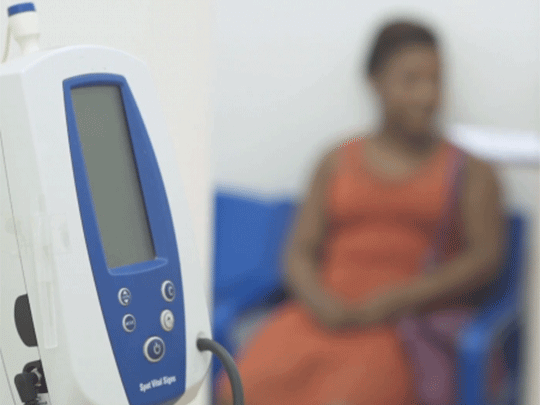Large NIH Clinical Trial Illuminates Long-Term Health Effects of HIV
Topics

Cross-posted from NIAID Now Blog
Initial data from a large NIH-supported clinical trial offer a detailed look at the health status of people aging with HIV around the world. With 7,770 participants enrolled in 12 countries across five continents, the Randomized Trial to Prevent Vascular Events in HIV (REPRIEVEExit Disclaimer) is evaluating the ability of a statin medication, pitavastatin, to reduce the risk of heart disease among people with HIV. By leveraging data collected from this diverse group of study participants, researchers also are learning more about the long-term health effects of HIV. They report their initial findings in an August supplement for The Journal of Infectious DiseasesExit Disclaimer.
Today, thanks to highly effective daily antiretroviral therapy (ART), people living with HIV can expect a near-normal lifespan. But even when the virus is well-controlled with ART, people with HIV remain at higher risk for cardiovascular disease and other comorbidities compared to their HIV-negative peers.
Developing more effective prevention and treatment strategies for HIV-associated comorbidities will require a better understanding of these conditions and their prevalence among people with HIV. While primarily focused on heart disease prevention, REPRIEVE is poised to help broadly address these questions, thanks to comprehensive collection of demographic and health data among its diverse study population. Study participants are 50 years of age on average, have longstanding HIV, have been receiving ART for nearly a decade, and have relatively well-preserved immune function. More than 60% are non-white, and nearly a third are female.
The REPRIEVE investigators found that a substantial number of participants show signs of reduced kidney function, and a planned ancillary studyExit Disclaimer aims to determine whether pitavastatin also can slow or prevent kidney function decline. Results from a subset of REPRIEVE participants indicated that many have excess fat around the heart, a condition that increases risk of later developing heart problems. Impaired muscle strength and function are also common among the REPRIEVE population, findings from a separate ancillary study suggest.
For women, accelerated reproductive aging—a natural process that eventually leads to menopause—may heighten risk for heart disease and stroke. Among women with HIV in the REPRIEVE study, more advanced reproductive age was associated with two risk factors for cardiovascular disease: high waist circumference and high blood levels of hemoglobin. Women living in sub-Saharan Africa or Latin America and the Caribbean were more likely to experience accelerated reproductive aging than those living in high-income countries.
The initial REPRIEVE findings also provide insight into the relationship between HIV and heart disease among transgender people, about which little is known. Transgender people are disproportionately affected by HIV, and studies have suggested that hormone use as part of gender-affirming therapy may increase cardiovascular disease risk. By collecting data on gender identity and use of gender-affirming therapy, the REPRIEVE investigators aim to address this knowledge gap. Notably, their initial analysis revealed that high waist circumference was more common among transgender women, particularly those who were receiving gender-affirming therapy.
The REPRIEVE trial is ongoing, with results anticipated in 2023. REPRIEVE is primarily supported by NIAID and the National Heart, Lung and Blood Institute (NHLBI), both parts of NIH, and received additional funding from the NIH Office of AIDS Research. For more information about the trial, visit www.reprievetrial.orgExit Disclaimer or search ClinicalTrials.gov using identifier NCT02344290.
References:
SK Grinspoon et al. Leveraging a landmark trial of primary cardiovascular disease prevention in human immunodeficiency virus: introduction from the REPRIEVE coprincipal investigatorsExit Disclaimer. The Journal of Infectious Diseases DOI: 10.1093/infdis/jiaa098 (2020).
CJ Fichtenbaum et al. Patterns of antiretroviral therapy use and immunologic profiles at enrollment in the REPRIEVE trialExit Disclaimer. The Journal of Infectious Diseases DOI: 10.1093/infdis/jiaa259 (2020).
MV Zanni et al. Correlates and timing of reproductive aging transitions in a global cohort of midlife women with human immunodeficiency virus: insights from the REPRIEVE trialExit Disclaimer. The Journal of Infectious Diseases DOI: 10.1093/infdis/jiaa214 (2020).
LM Smeaton et al. Characteristics of REPRIEVE trial participants identifying across the transgender spectrum(link is external)Exit Disclaimer. The Journal of Infectious Diseases DOI: 10.1093/infdis/jiaa213 (2020).
ET Overton et al. An evaluation of baseline kidney function in the REPRIEVE trial of pitavastatin in human immunodeficiency virusExit Disclaimer. The Journal of Infectious Diseases DOI: 10.1093/infdis/jiaa222 (2020).
T Umbleja et al. Physical function impairment and frailty in middle-aged people living with human immunodeficiency virus in the REPRIEVE trial ancillary study PREPAREExit Disclaimer. The Journal of Infectious Diseases DOI: 10.1093/infdis/jiaa249 (2020).
TG Neilan et al. Myocardial steatosis among antiretroviral therapy–treated people with human immunodeficiencyExit Disclaimer